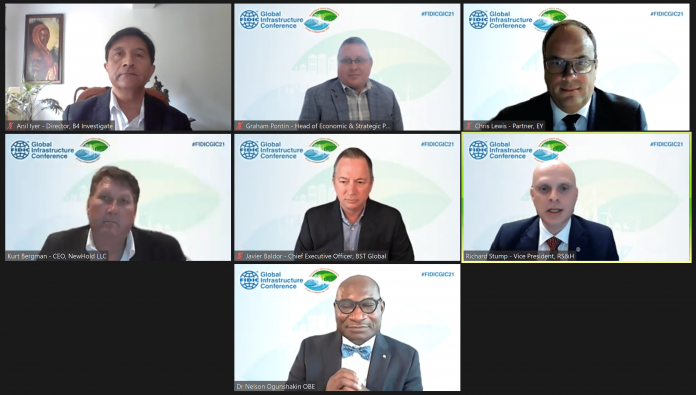Data can help better manage projects and ensure a company’s financial health.
Global industry leaders highlighted the importance of addressing corruption and embracing technology and data in ensuring a resilient financial future for the industry at a roundtable finance forum session today (13.9.21) hosted by the International Federation of Consulting Engineers (FIDIC) as part of its 2021 Global Infrastructure Conference.
Speakers at the forum looked at wider financing and the external factors that affect companies and their finances, as well as focusing on company performance, productivity and finances.
Kicking off proceedings, EY partner Chris Lewis discussed the current trends around the project financing and delivery, saying that “promoting sustainable infrastructure is a key priority for governments”. Lewis highlighted that a key priority for projects to take on board would be to understand what people want to do to ensure they live sustainably and focus on projects that enable that. “We are moving beyond traditional PPP models into a whole world of other types of projects with the use of a complex set of funding mechanisms,” Lewis explained.
Discussing the current corruption issues many countries and organisations face, B4 Investigate director Anil Iyer made the point that due to inefficiencies, countries wasted approximately one third of their infrastructure spending, primarily due to mismanagement and corruption. Iyer said that the issue was a global one, with around 34% of emerging market economies reporting losses in their infrastructure spending. When asked about the tools that could be used to combat corrupt activities, Iyer said that framework agreements that enabled a multi-stakeholder approach were crucial. Citing a case study, Iyer highlighted that in 2020 Thailand was able to save $360 million by implementing robust systems and frameworks.
Asked whether the infrastructure sector was investing enough in technology, BST Global CEO Javier Baldor explained that those firms that do well in the future would be those that embrace data and big data and, looking at the current situation where firms were, more would clearly need to be done. “Organisations have access to a tremendous amount of data and a minimal amount is usually leveraged,” he said.
Discussing the use of data in better predicting projects and project outcomes, Baldor said: “The key question we should all be asking is how can learn from the data and provide resilient outcomes? How can you leverage these technologies to help you predict and better understand the issues that are coming? The companies capable of doing this will be the organisations of the future,” he claimed.
Kurt Bergman, CEO of private investment firm NewHold, when asked if consultancy and engineering firms are attractive to the investment sector, said: “The current top performing firms are highly focused on their KPIs. Those that place their KPIs as a high priority and ensure attraction and retention of talent are more resilient and attractive.” Bergman said that agility and flexibility were key. “Resilience in your company is about being flexible and well positioned for tomorrow, so we need to evolve and do things better and, most importantly, we need to make those investments,” said Bergman.
Addressing the key issue of the attraction and retention of talent, EY’s Chris Lewis said: “People have been working harder than ever, but now is the time to focus on the workplace experience that people have”. The panel of industry figures all echoed Lewis’s sentiments, with Javier Baldor concluding “Pick the right project, the right work – and make sure it’s future proof!”
You can read our coverage of the news and insights that emerge here.


















